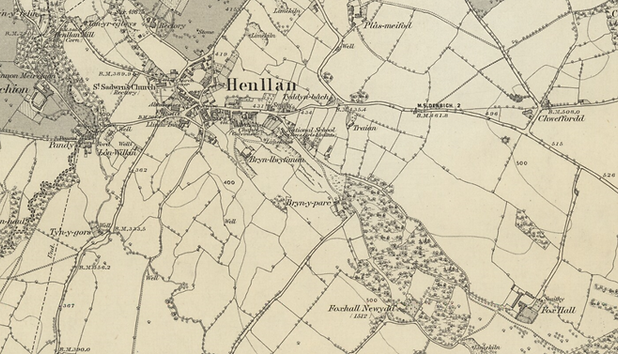
Dic Spot
Elias Owen tells in his book, Welsh Folk Lore, how it was believed that there were once men who had magical powers, supernatural understanding and an awareness of the spirit world. It was believed that these men gained their powers through several means.
Some gained their powers through selling themselves to Satan, and these were considered evil men whose acts were largely malicious. They were required to ‘unbaptize’ themselves, by going to a holy well, taking the water there in the mouth three times and spitting it out in a ‘derisive fashion’, thus making himself ready for Satan’s contact.
Others gained their powers through the study of arcane texts, and these individuals were considered to be good men, able to prevent the evil of other conjurors, even though the ignorant were often suspicious of them and their art. A third class of conjuror seem to have inherited their powers from their ancestors.
Of the many conjurors, or cunning men as they are sometimes called, perhaps the most famous was Richard Morris, more famously known as, Dic Spot. There are many tales of his actions in North Wales, and he travelled far and wide, often righting wrongs through magical means. In an obituary of ‘considerable persons’ in 'The Gentleman's Magazine’, dated 1792, the following passage gives a sense of the man.
‘At Oswestry, in Shropshire, in the 85th year of his age, Mr Richard Morris, better known as Dick Spot the Conjuror, in which profession he was thought by country people to excel most other astrologers. He was a man of no education; but endowed with strong natural abilities, with which he had read mankind to some purpose. His person was tall and muscular, with much expression in his marked countenance. He had a dark spot on the side of his face, from whence his nickname took its life. He was in good credit and well spoken of by the generality as a good sort of man. He was charitable to the poor. Latterly he was in affluent circumstance and kept his carriage, when his fee was in all cases a piece of gold.’
There is a wonderful tale of his trapping a spirit beneath a rock in the Llanwddan Valley, which could only escape when ‘the water should work its way between the stone and the dry land.’ Of course, many years later the valley was turned into a lake, and the Welsh workmen present were extremely wary of blasting rocks on the valley floor for fear of releasing the malicious spirit.
The most famous story of Dic Spot in North East Wales was his visit to Llindir Inn at Henllan. On his way to Llanrwst, Dic stopped off for a little refreshment at the Inn. On calling for ale, bread and cheese, he was charged an outrageous amount; four pence for the beer and 6 pence for the bread and cheese. Despite his umbrage, Dic paid the bill, but before leaving, he wrote a spell on a slip of paper and slipped it beneath the leg of the table at which he sat. He left soon after.
That evening, the landlord and his wife retired to bed, leaving the serving girl to clean up. It was not long before their rest was disturbed by a tremendous ruckus of stomping and shouting,
“Six and four are ten, Count it o’er again,” she was yelling.
The landlord rushed down to the kitchen and in the doorway was brought up short by the shocking sight of the serving girl throwing herself about the room, jumping up and down, throwing out her arms and shouting out the words,
‘Six and four are ten, Count it o’er again!’
The man demanded the serving girl stop her gyrating and her singing and get herself to bed, but his only answer was,
‘Six and four are ten, Count it o’er again!’
Had she lost her mind? It was seriously considered by the landlord. He made to grasp the girl, but as soon as his foot had met the floor of the kitchen, he leapt into the air and began to dance, joining in the cry of,
‘Six and four are ten, Count it o’er again!’
With the noise thus doubled, the landlady came down the stairs, aggrieved that her husband had failed to stop the madness, and indeed seemed to have joined in the shenanigans. She arrived at the kitchen and saw the foolish dancing and shouting. She shouted but could not be heard, though her husband looked upon her with madness in his eyes. She entered the kitchen and immediately joined in the dance.
‘Six and four are ten, Count it o’er again!’
The noise was now such that the neighbours were awake. They guessed that Dic Spot, who many had seen at the Inn earlier that day, was the cause of this madness. One of the neighbours saddled a horse and rushed after the conjuror, who luckily did not seem to have gone far. Indeed, he seemed to be taking his time in reaching Llanrwst, and was whistling to the dark of the night when the neighbour approached. On being asked to return to the Inn and break the spell, Dic replied that there was no need,
‘take the piece of paper that is under the table in the bar and burn it, and they will then stop their row.’
The neighbour returned to the Inn, and rushed into the bar. Taking the slip of paper from beneath the table leg he threw it into the fire. As soon as this was done, the trio of dancers collapsed to the floor in a pile of twisted arms, legs, skirts and night clothes, exhausted and panting.
Such was Dic Spot’s punishment for exorbitant charges.
Further Reading
E. Owen, Welsh Folk-Lore: A Collection of the Folk-Tales and Legends of North Wales, Woodhall, Minshull & Co., Oswestry & Wrexham (1896)

